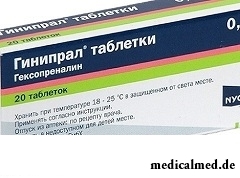





Ginipral
Application instruction:
 Ginipral – the drug promoting decrease in a tone and sokratitelny activity of a myometrium.
Ginipral – the drug promoting decrease in a tone and sokratitelny activity of a myometrium.
Form of release and structure
Ginipral release in the following dosage forms:
- Tablets: white, biconvex, round (on 10 pieces in blisters, on 2 blisters in a cardboard pack);
- Solution for intravenous administration: colourless, transparent (in ampoules on 2 ml, on 5 ampoules in plastic pallets, on 1 or 5 pallets in a cardboard pack).
Is a part of 1 tablet:
- Active agent: a geksoprenalina sulfate – 0,5 mg;
- Auxiliary components: talc, corn starch, коповидон, hydrate of lactose, dinatrium эдетат dihydrate, magnesium stearate, glitserola of palmitate stearate.
Is a part of 1 ml:
- Active agent: a geksoprenalina sulfate – 0,005 mg;
- Auxiliary components: dinatrium эдетат a dihydrate, sulphuric acid 2N (for maintenance of level рН), sodium pyrosulphite, sodium chloride, water for injections.
Indications to use
Ginipral in the form of solution for injections appoint in the following cases:
- Massive tocolysis: for braking of premature labor pains at disclosure of a pharynx of a uterus and/or existence of a smoothed neck of uterus;
- Acute tocolysis: as an emergency measure at premature births before delivery of the pregnant woman in hospital; for braking of labor pains at the time of delivery at a uterus immobilization before Caesarian section, acute intrauterine asphyxia, the complicated patrimonial activity, an umbilical cord prolapse, and also before version from cross situation;
- Long tocolysis: for prevention of premature births at the speeded-up or strengthened pains without disclosure of a pharynx of a uterus or smoothing of a neck; at a uterus immobilization to, in time and after a cervical cerclage.
Ginipral in the form of tablets apply at threat of premature births (most often as continuation of infusional therapy).
Contraindications
- Tachyarrhythmias;
- Thyrotoxicosis;
- Aortal stenosis and defect of the mitral valve;
- Myocarditis;
- Serious illness of kidneys and liver;
- Arterial hypertension;
- Coronary heart disease;
- Premature placental detachment, uterine bleedings;
- Intrauterine infections;
- Closed-angle glaucoma;
- First trimester of pregnancy and period of a lactation (breastfeeding);
- Hypersensitivity to drug components (especially at patients with bronchial asthma and hypersensitivity to sulfites in the anamnesis).
Route of administration and dosage
Ginipral's solution is entered intravenously slowly for 5-10 minutes. The doctor selects a dose individually. It is necessary to drive drug after cultivation to 10 ml isotonic solution of sodium of chloride, using automatically dosing infuzomata or usual infusional systems.
The scheme of use of drug is defined by indications:
- Massive tocolysis: Ginipral's introduction is begun with 0,01 mg (1 ampoule on 2 ml) with the subsequent infusion with a speed of 0,0003 mg a minute. Also perhaps infusional use of drug without preliminary bolyusny introduction;
- Acute tocolysis: drug is used in a dose 0,01 mg. In need of further therapy can be continued by means of infusions;
- Long tocolysis: Ginipral appoint in the form of long drop infusion with a speed of 0,000075 mg a minute.
If resuming of pains does not happen within 48 hours, treatment is continued Ginipral in the form of tablets.
Pill is taken orally, washing down with a small amount of water.
At threat of premature births Ginipral appoint in a dose 0,5 mg (1 tablet) in 1-2 hours prior to the end of infusion.
At first accept on 1 tablet each 3 hours, then each 4-6 hours. A daily dose – from 4 to 8 tablets (2-4 mg).
Side effects
- Central and peripheral nervous system: dizziness, headache, easy tremor of fingers, uneasiness;
- Alimentary system: seldom – vomiting, nausea, oppression of motility of intestines, temporary increase in level of transaminases, intestinal impassability (it is recommended to control a chair regularity);
- Cardiovascular system: tachycardia at mother (in most cases heart rate at a fruit remains invariable), arterial hypotension (diastolic is more often); seldom – cardialgias (usually after drug withdrawal quickly disappear), disturbances of a rhythm (ventricular premature ventricular contraction);
- Laboratory indicators: a hypocalcemia in an initiation of treatment, a hypopotassemia, increase in level of glucose in a blood plasma;
- Allergic reactions: a bronchospasm, breath difficulty, disturbance of consciousness up to a coma, an acute anaphylaxis (at patients with bronchial asthma or hypersensitivity to sulfites);
- Others: an oliguria, the increased sweating, hypostases (especially at patients with diseases of kidneys).
At newborns side effects can be shown as acidosis and a hypoglycemia.
Special instructions
At Ginipral's use it is recommended to control carefully function of cardiovascular system (arterial pressure, heart rate) of a fruit and mother. Also it is necessary to register an ECG to and during treatment.
Patients with hypersensitivity to sympathomimetics are recommended to appoint small doses of Ginipral which the doctor selects individually. Also such patients need constant medical observation.
At considerable increase of heart rate at mother (it is more than 130 beats per minute) or/and at the expressed lowering of arterial pressure the dose of drug needs to be lowered.
At emergence of symptoms of heart failure, pains in heart and the complicated breath Ginipral's use needs to be stopped immediately.
During therapy, especially during an initial stage, increase in glucose in a blood plasma in this connection at mothers with a diabetes mellitus it is necessary to control indicators of carbohydrate metabolism is possible. If childbirth happens right after carrying out a course of treatment, it is necessary to consider a possibility of development in newborn acidosis and a hypoglycemia that it is connected with transplacental penetration of ketonic and lactic acids.
At Ginipral's use the diuresis therefore it is necessary to watch closely liquid delay signs in an organism goes down.
During Ginipral's infusions can sometimes lead simultaneous use of glucocorticosteroids to a fluid lungs. Therefore at infusional therapy constant control of a condition of patients is necessary. It is especially important at the combined treatment by glucocorticosteroids at patients with diseases of kidneys. It is necessary to limit excess reception of liquid strictly. Because of risk of possible edematization of lungs it is necessary as far as it is possible, to limit the volume of infusions. Also it is recommended to limit the use of salt in a diet.
During use of drug it is necessary to watch a regularity of activity of intestines.
Before tokolitichesky treatment it is necessary to accept potassium drugs as action of sympathomimetics on a myocardium at a hypopotassemia amplifies.
Simultaneous use of sympathomimetics and means for the general anesthesia (halothane) can cause disturbances of a heart rhythm. Therefore before use of a halothane therapy by Ginipral should be stopped.
At long tokolitichesky therapy it is necessary to watch a condition of a fetoplacental complex. It is also necessary to be convinced of lack of placental detachment which clinical symptoms against the background of tokolitichesky therapy can be maleficiated. At disclosure of a neck of uterus it is more than on 2-3 cm and a rupture of a bag of waters Ginipral's use is inefficient.
When performing tokolitichesky treatment using beta-adrenergic agonists strengthening of symptoms of the accompanying dystrophic myatonia is possible. In these cases use of drugs of diphenylhydantoin (Phenytoinum) is recommended.
Strengthening of side effects of Ginipral at its use in the form of tablets with coffee or tea is possible.
Medicinal interaction
At simultaneous use of Ginipral with some medicines there can be undesirable effects:
- Beta adrenoblockers: easing or neutralization of action of Ginipral;
- Peroral hypoglycemic drugs: weakening of their action;
- Methylxanthines (including theophylline): strengthening of efficiency of Ginipral;
- Glucocorticosteroids: decrease in intensity of accumulation in a glycogen liver;
- Other medicines with sympathomimetic activity (broncholitic and cardiovascular drugs): emergence of symptoms of overdose and strengthening of effect of these drugs on cardiovascular system;
- Ftorotanum and beta адреностимуляторы: strengthening of side effects of Ginipral from cardiovascular system.
Ginipral is incompatible with tricyclic antidepressants, monoamine oxidase inhibitors (MAO), ergot alkaloids, and also with the medicines containing vitamin D and calcium, mineralokortikoida and Dihydrotachysterolum.
Sulfite – a highly active component therefore it is not necessary to mix Ginipral with any other solutions, except 5% of solution of glucose (dextrose) and isotonic solution of sodium of chloride.
Terms and storage conditions
To store at a temperature of 18-25 °C in protected from light, the place, unavailable to children.
Period of validity:
- Solution for intravenous administration – 3 years;
- Tablets – 5 years.
Name of drug
Price
Drugstore
Ginipral solution for infection 10 mkg 2 ml of amp No. 5, Nycomed
268 rub.
 Network of the Moscow drugstores of IFC
Network of the Moscow drugstores of IFCGinipral solution for внутривеннго introductions 10mkg/2ml 2 ml 5 pieces
270 rub.
 Apteka вер.ру, LLC
Apteka вер.ру, LLCEven if heart of the person does not fight, then he all the same can live during a long period, as the Norwegian fisherman Jan Revsdal showed us. Its "motor" stopped for 4 hours after the fisherman got lost and fell asleep in snow.

Helminthosis is one of the most widespread diseases. Statistically, with any species of helminths it is infected porridges...
Section: Articles about health
Since the moment when the child becomes a school student, his sight begins to be exposed to the strengthened loadings which are supplemented with viewing of animated films and long computer games. During this period of life of the child development not completely created bodies to a zra...
Section: Articles about health
During foot walks blood moves on vessels more actively and one and all bodies are supplied with a large amount of oxygen. It affects the state of health of the person very positively....
Section: Slideshow
For the last decades the diabetes mellitus of the second type became really world problem. Number of cases annually cart...
Section: Articles about health
A little more than a century ago goat milk was a traditional food stuff of most of Russians. Unfortunately, today on tables of our compatriots it appears extremely seldom. The reason that the use of so useful product practically descended on...
Section: Articles about health
White teeth and the Hollywood smile – a dream of many people. Long time was considered that the plaque on teeth and change of their color – destiny of those who incorrectly eat smokes and badly brushes teeth. But the paradox is available: at everything the variety of toothpastes, brushes existing today for toothbrushing and conditioners for a mouth the number of the people hesitating of a plaque on teeth does not decrease. Moreover, the plaque is formed even at small children who definitely do not smoke and have no coffee. So in what business, and опас...
Section: Articles about health
Milk and products of its processing by right occupy one of the main places in a diet of the modern person. They contain necessary...
Section: Articles about health
Sugar - the digestible refined product which is not of special value for an organism of the modern person. The use of sugar in food is based rather on the psychological dependence caused by desire to indulge itself with something tasty, and in дальнейш...
Section: Articles about health
Cold, puffiness of a nose, itch, the watering eyes - characteristic symptoms of the allergic rhinitis resulting from hit of allergens (pollen, house dust, hair of animals, etc.) on a mucous membrane of a nose. Unpleasant feelings often give trouble, serving as the reason of a headache, an acrimony, sleep disorders, and in certain cases and the states close to a depression. How to get rid of undesirable satellites of a disease if near at hand there are no antiallergic...
Section: Articles about health
About 20% of the population of our planet have a hypertension (permanent increase in arterial pressure). This disease negatively narrations...
Section: Articles about health
The medicine promptly develops, and the fact that else quite recently it seemed by miracle can now. We are not surprised any more to the fact that people with artificial joints and extremities can play sports, organ transplantation became a routine, and the latest cancer medicine п...
Section: Articles about health
Not everyone can brag of the shining Hollywood smile. Even the person who is regularly visiting the stomatologist and watching of oral cavities over health periodically has problems: enamel of teeth darkens under the influence of some products, on it the deposits giving to teeth a grayish or yellowish shade collect....
Section: Articles about health
Color of plants is caused by presence at them of certain chemical compounds. Let's talk that various colors mean vegetable...
Section: Articles about health
Dietary supplements (dietary supplements) for the last decades were so thoroughly included into our life that, apparently, it is already impossible to find the person who at least once did not try them. At the same time, most of our compatriots have a vague idea about...
Section: Articles about health
Cold – a state known to everyone which is followed by cold, cough, high temperature, a pharyngalgia. Often the first that we begin to do in hope again to become healthy – to accept medicines which are not always harmless whereas it is easy to facilitate displays of a disease by means of natural means. They not only softly eliminate disease symptoms, but also enrich the weakened organism with useful substances. We present you 8 drinks which are successfully used for...
Section: Articles about health
The saying "the rich do not know how the other half lives" is known to all. In a broad sense it is that we can not always understand the person, about...
Section: Articles about health
History of mankind contains several tens of epidemics whose emergence was compared by eyewitnesses and historians to doomsday. The most terrible of them claimed the lives of millions of people, having made even the whole people to the person of the earth. What they − the diseases striking terror? Daringly...
Section: Articles about health
Herpes simplex of the first type (the infectious disease which is shown periodic bubble rashes on lips is called) – one of the most widespread illnesses. Statistically, only 5% of inhabitants of our planet are unreceptive to its activator, and the reasons of this feature are still not found out. Other people are virus carriers....
Section: Articles about health
History of cultivation of a buckwheat contains more than five thousand years. Grain which is received from this plant is used for пригото...
Section: Articles about health
Within several decades of our compatriots convinced that the use of butter nasty affects a condition of coronary vessels. As a result the reputation of a product was impaired thoroughly a little, and many almost ceased to include...
Section: Articles about health
The winter swimming in open reservoirs called in our country by "winter swimming" – officially recognized sport and one of the most extreme ways of a hardening of an organism. This occupation has an old story and adherents in many countries. The international competitions in winter heats on open water, and every two years – the World Cup are annually held. Despite huge popularity and the proved advantage for health, winter swimming is still surrounded with hardy delusions. Ра...
Section: Articles about health
(Xerostomia) many people consider feeling of a xerostomia small and easily removable inconvenience. This delusion...
Section: Articles about health
The naturopathy sometimes moves as the new direction of medicine, something like fashionable hobby, and there is nothing farther from the truth. This most ancient direction, the word "naturopathy" is translated as "treatment by the nature", and, no doubt, treatment приро...
Section: Articles about health
Bathing in broths of medical flowers and plants (phytobathtub) was eurysynusic since Cleopatra who is a good judge in all that concerns beauty and health. And today phytobathtubs is the simple and available means allowing not only to remove nervous tension, but also to recover from many diseases. Grass bathtubs at treatment of cold, osteochondrosis, radiculitis, skin diseases, and also diseases of urinary tract and vessels are especially effective....
Section: Articles about health
Tick-borne encephalitis – one of the most dangerous viral diseases which causative agents transfer and is given to people by ixodic mites. Эт...
Section: Articles about health
For residents of the countries of Southeast Asia various algas are an obligatory component of a daily diet. Their popularity is connected not only with high tastes, but also with numerous curative properties. Russians are a little familiar with...
Section: Articles about health
Sooner or later hair turn gray at all. Many people try to hide these changes, returning natural color of the hair by means of coloring, or considerably changing it for the purpose of creation of absolutely new image. All know that the gray hair is a sign of the coming old age, so, it is necessary to get rid of it....
Section: Articles about health
